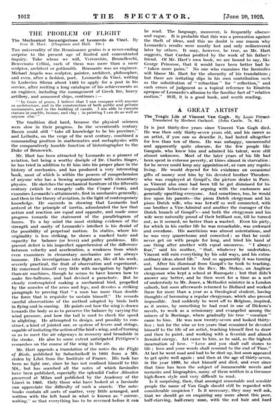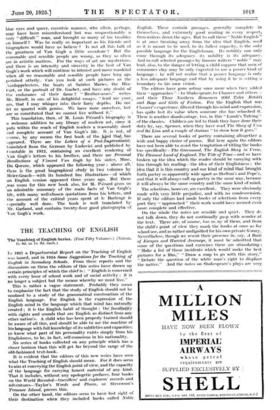A GREAT ARTIST
The Tragic Life of Vincent Van Gogh. By Louis PiOranl. Translated by Herbert Garland. (John Castle. 7s. 6d.) IT is just thirty-five years since _Vincent Van Gogh died. He was then only thirty -seven years old, and his career as an artist, if you can so describe it, had lasted altngether for less than ten of them. He was unhappy, unsuccessful and apparently quite obscure, for the few people like Gauguin, ,who knew him and admired his talent, were still almost unknown. MoSt of the later years of his life had been spent in extreme poverty, at times almost in starvation ; for he never could keep any appointment, or earn any regular living. He would depend for his existence on occasional gifts of money sent him by his deVoted brother Theodore, who was employed at Goupil's, the picture dealer in Paris: as Vincent also once had been till he -got disMissed for his impossible behaviour—for arguing with the customers and generally upsetting everyone. And sometimes, too, he would live upon his .parents—the pious Dutch clergyman and his pious Dutch wife, who was herielf so well connected, with one brother a Vice-Admiral and another the manager of the Dutch branch of Goupirs— and both the clergyman and his wife were naturally proud of their brilliant son, till he turned out, as it seemed, no better than a wastrel. Even his piety, for which in his earlier life he was remarkable, was awkward and overdone. His asceticism was almost ostentatious, and he was very quarrelsome and conceited ; so that he could never get on with people for long, and tried his hand at one thing after another with equal unsuccess. " I always fear," said his mother, " that, whatever he undertakes, Vincent will ruin everything by his odd ways, and his extra- ordinary ideas about life." And so apparently it was turning out. After his dismissal from Goupirs-he took to teaching, . and became assistant to the Rev. Mr. Stokes, an Anglican clergyman who kept a school at Ramsgate ; but that didn't answer any better, and he then went for a time as a sort of understudy to Mr. Jones, a Methodist minister in a London suburb, but soon afterwards returned to Holland and worked there for more than a year as a theological student, having thoughts of becoming a regular clergyman, which also proved impossible. And suddenly he went off to Belgium, inspired, as it seems, by something he had read in one of Dickens's novels, to work as a missionary and evangelist among the -miners of le Borinage, where gradually his true " vocation " came to him. He was now twenty-seven and looked thirty:- five ; but for the nine or ten years that remained he devoted himself to the life of an artist, teaching himself first to draw and then to paint, and working with a feverish and almost frenzied energy. tart came to him, as he said, as the highest incarnation of love. " Love and you shall call stones to life ; love and your words shall resound to the end of Time." At last he went mad,and had to be shut up, but soon appeared to get quite well again ; and then at the age of thirty-seven, in the year 1890, lie shot himself and died, and ever since that time has been the subject of innumerable novels and memoirs and biographies, many of them written in a tiresome high-flown style and very difficult to read.
Is it surprising, then, that amongst reasonable and sensible people the name of Van Gogh should still be regarded with considerable suspicion ? Is it necessary, they may well ask, that we should go on enquiring- any more about this poor, half-starving, half-crazy man, with the red hair . and hard
blue eyes and queer, eccentric manner, who often, perhaps. may have been misunderstood but was unquestionably a very "difficult " man, and brought so many of his troubles on himself ? Was he really so important as his friends and biographers would have us believe ? Is not all this talk of the greatness of Van Gogh a little overdone ? But the reasonable and sensible people are wrong, as they so often are in artistic matters. For the ways of art are mysterious, and there is an intensity and sincerity in the best of Van
Gogh's work which will continue to interest and move mankind when all we reasonable and sensible people have long ago. perished utterly. Can you • look at such pictures as the Aardappeleeters, the boats at Saintes. Merles, the Blue Cart, or the portrait of Dr. Cachet, and have any doubt of the endurance of their fame ? " Brother-asses," writes Mr. Birrell, in one of his delightful essays, " lend me your ars, that I may whisper into their furry depths. Do not let us quarrel with genius. We have none ourselves, but are so constituted that we cannot live without it."
This translation, then, of M.. Louis Pierard's biography is a welcome addition to any library of modern art, since it puts within the reach of English readers a reasonably short and complete account of Van Gogh's life. It is not of course, by any means the first book of the „kind that .114 appeared. 'there are the Letters of a Post-Impressionist, translated from the German by Ludovici and published by Constable in 1912, containing an excellent rendering of , Van dogh's letters to his brother, and there are Personal _Recollections of Vincent Van Gogh by his sister, Mine. Du Qnesne, which appeared the following year ; above all, there is the great biographical study in two volumes by Meier7Graefe7—with its hundred fine illustrations—of which an English version appeared three years ago. But there was room for this new book also, for M. P;erard gives us .an admirable summary of the main facts of Van Gogh's life, with many well -.chosen quotations from his letters, and the account of the critical years spent at le Borinage is especially.. well done. The book is well translated by Mr. Garland, and contains twenty-fOur good photographs of
• Van Gogh's work.











































 Previous page
Previous page